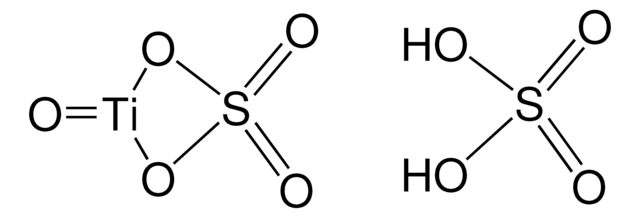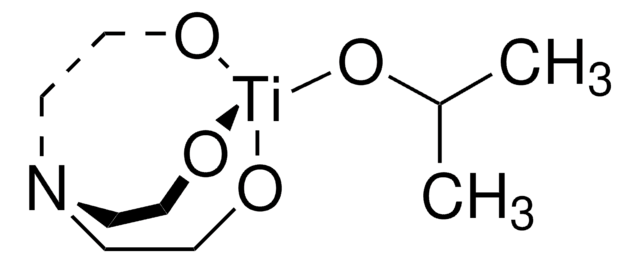14007
Potassium titanium oxide oxalate dihydrate
Synonym(s):
Dipotassium oxodioxalatotitanate(IV) dihydrate, Oxotitanium potassium ethanedioate hydrate (1:2:2:2)
About This Item
Recommended Products
form
solid
Quality Level
reaction suitability
core: titanium
reagent type: catalyst
SMILES string
O.O.[K+].[K+].[O-]C(=O)C(=O)O[Ti](=O)OC(=O)C([O-])=O
InChI
1S/2C2H2O4.2K.2H2O.O.Ti/c2*3-1(4)2(5)6;;;;;;/h2*(H,3,4)(H,5,6);;;2*1H2;;/q;;2*+1;;;;+2/p-4
InChI key
PGGRHIGITIPOBF-UHFFFAOYSA-J
General description
Application
- A catalyst to synthesize chromene derivatives via three-component condensation reaction of aromatic aldehydes, malononitrile, and resorcinol/ naphthol.
- An electrolyte to functionalize the surface of aluminum alloy with TiO2 layer by plasma electrolytic oxidation (PEO).
PTO can be used as a precursor to synthesize titanium dioxide (TiO2) nanoparticles.
Storage Class Code
13 - Non Combustible Solids
WGK
WGK 3
Flash Point(F)
Not applicable
Flash Point(C)
Not applicable
Personal Protective Equipment
Choose from one of the most recent versions:
Certificates of Analysis (COA)
Don't see the Right Version?
If you require a particular version, you can look up a specific certificate by the Lot or Batch number.
Already Own This Product?
Find documentation for the products that you have recently purchased in the Document Library.
Customers Also Viewed
Our team of scientists has experience in all areas of research including Life Science, Material Science, Chemical Synthesis, Chromatography, Analytical and many others.
Contact Technical Service











